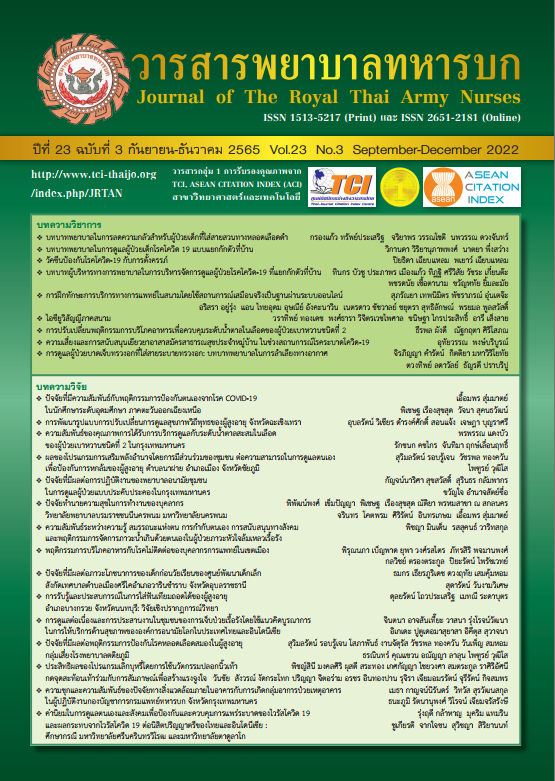Diet Consumption Behavior Modification to Control Blood Sugar Levels of Type 2 Diabetes Mellitus Patients
Keywords:
Diet Consumption, Behavior Modification, Control Blood Sugar Levels, Type 2 DiabetesAbstract
Type 2 Diabetes is a major global public health problem. High blood sugar levels are the leading causes of diabetic complications. The current guidelines to control blood sugar levels focus on diet consumption behavior promotion. According to research evidence, most type 2 diabetes mellitus patients participating in behavior change programs or receiving activities as prescribed by the hospital but still cannot control blood sugar levels due to lack of diet consumption behavior to control blood sugar levels. The previous studies on factors influencing diet consumption behavior included personal cognitive factors, socio-environmental factors, behavior factors, individual beliefs factors and cues to action factors. Therefore, the review on relevant theories, behavior modification techniques for diet consumption and evidence-based practice will guide health care professional to design appropriate intervention and activities for type 2 diabetes mellitus patients.
Downloads
References
International Diabetes Federation [Internet]. IDF DIABETES ATLAS 10TH Edition 2021. [update 2021; cited 2022 Oct 20] Available from International Diabetes Federation.
Bureau of Non-Communicable Diseases Department of Disease Control. Percentage indicator of patients with diabetes and hypertension that can be controlled 2017, Bureau of Non-Communicable Diseases Department of Disease Control, 2017.
Tongpeth. J. Effectiveness of self - management promoting potential program on blood sugar control and quality of life among diabetes mellitus type 2 patients. Journal of The Royal Thai Army Nurses, 2013; 14 (2): 69-78. (in Thai)
Juangsaman S. Guidelines for the Care of Type 2 Diabetes. Bangkok: Kanpim.com; 2015. (in thai).
Cradock KA, G OL, Finucane FM, Gainforth HL, Quinlan LR, Ginis KA. Behaviour change techniques targeting both diet and physical activity in type 2 diabetes: A systematic review and meta-analysis. The International Journal of Behavioral Nutrition and Physical Activity. 2017;14(1):18.
Chrvala CA, Sherr D, Lipman RD. Diabetes self-management education for adults with type 2 diabetes mellitus: A systematic review of the effect on glycemic control. Patient Education and Counseling. 2016;99(6):926-43.
Lepard MG, Joseph AL, Agne AA, Cherrington AL. Diabetes self-management interventions for adults with type 2 diabetes living in rural areas: A systematic literature review. Current Diabetes Reports. 2015;15(6):608.
Pamungkas RA, Chamroonsawasdi K, Vatanasomboon P. A systematic review: Family support integrated with diabetes self-management among uncontrolled type II diabetes mellitus patients. Behavioral Sciences (Basel, Switzerland). 2017;7(3).
Srisaket J, Chaisa P, Wanchai A, Meeboonmak Y, Phokhwang-Just W. Diet Consumption Behavior Modification Patterns to Control Blood Sugar Levels of Patients with Diabetes in Thailand: A Systematic Review. EU Heritage Journal Science and Technology. 2017; 11(2): 156-170. (in Thai)
Phetphum C. Health Behaviors Concept, theory, and application. Phitsanulok: Naresuan University Publishing House; 2017. (in thai).
Bandura A. Observational learning. In A. Bandura. Social foundations of thought and action: A social cognitive theory. Englewood Cliff, NJ: Prentice-Hall; 1968: 196-195.
Tadayon Nabavi R. Bandura’s Social Learning Theory & Social Cognitive Learning Theory. 2012.
Becker M.H., Maiman L.A. The health belief model: Origins and correlation in psychological theory. Health Education Monography. 1975; 2:336-85.
Yoschamras S. & Nippanon P. The effects of self-efficacy and goal setting to compare for blood sugar control behaviors of type 2 diabetes patients in Chumphae hospital, Chumphae district, KhonKaen province. Journal of Public Health Research. 2013; 6(3): 21-30. (in Thai)
Piboon K., Jaidee W., Chailkongkit K. A Systematic Review of Type 2 Diabetic Care Intervention among Elderly People. The Journal of Faculty of Nursing Burapha University. 2015; 23(2): 1-19. (in Thai)
Tepsuriyanont S. A causal model of dietary control behavior among diabetic patients. Journal of Nursing and Health Sciences. 2015; 9(2): 10-22. (in Thai)
Walker RJ, Gebregziabher M, Martin-Harris B, Egede LE. Independent effects of socioeconomic and psychological social determinants of health on self-care and outcomes in Type 2 diabetes. General Hospital Psychiatry. 2014;36(6):662-8.
Funagfung, S., Kaveevivitchai, C., Piaseu, N. Effects of diet control program using food exchange on knowledge, health behaviors and blood glucose levels among persons with type 2 diabetes in district health promoting hospitals. Journal of Public Health Nursing. 2015; 29(3):34-49. (in Thai)
Phungdee T. The Effectiveness of Exercise Behaviors Promotion Program of Diabetes Mellitus Type 2 Patients. Journal of The Royal Thai Army Nurses, 2017; 18 (Supplement): 291-298. (in Thai)
Downloads
Published
How to Cite
Issue
Section
License
Copyright (c) 2022 Journal of The Royal Thai Army Nurses

This work is licensed under a Creative Commons Attribution-NonCommercial-NoDerivatives 4.0 International License.
บทความหรือข้อคิดเห็นใดใดที่ปรากฏในวารสารพยาบาลทหารบกเป็นวรรณกรรมของผู้เขียน ซึ่งบรรณาธิการหรือสมาคมพยาบาลทหารบก ไม่จำเป็นต้องเห็นด้วย
บทความที่ได้รับการตีพิมพ์เป็นลิขสิทธิ์ของวารสารพยาบาลทหารบก
The ideas and opinions expressed in the Journal of The Royal Thai Army Nurses are those of the authors and not necessarily those
of the editor or Royal Thai Army Nurses Association.






